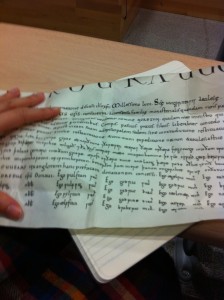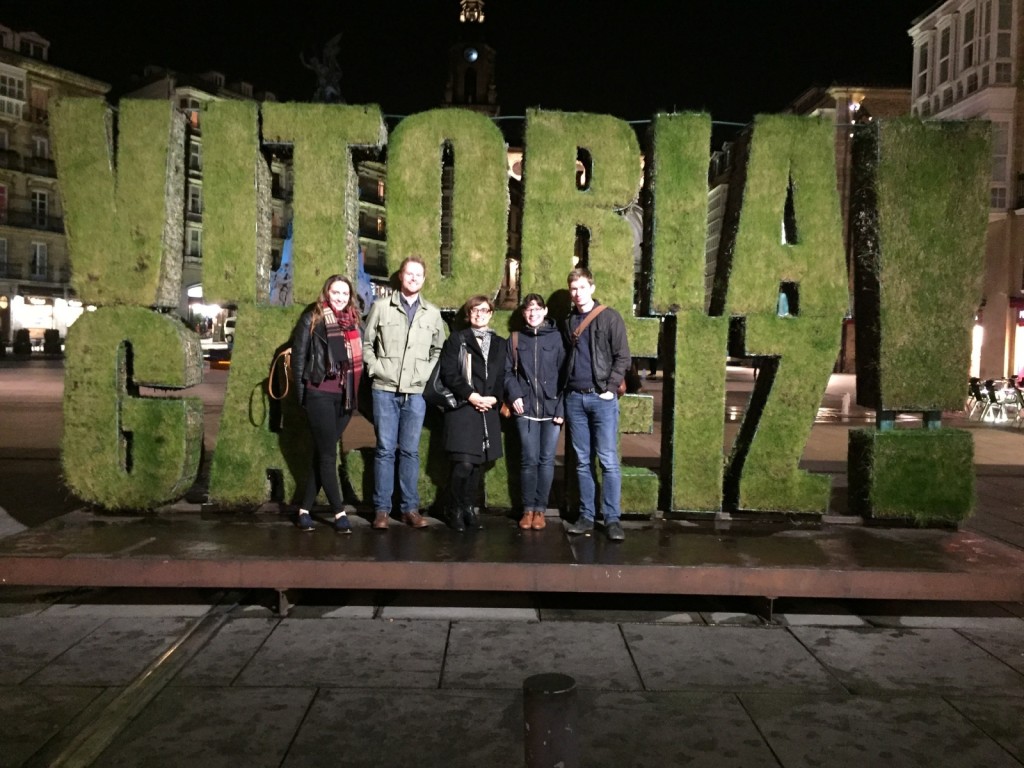Last month, Professor Simon Keynes (Cambridge) delivered a lecture on ‘Anglo-Saxon charters in the vernacular’. The lecture is now available online to view here.
|
||||||
|
We are excited to be welcoming four more speakers to Vitoria over the next two months in the continuation of our lecture series. Here are the details for the forthcoming talks. All are warmly invited to attend. For further information, please contact Francesca Tinti (francesca.tinti@ehu.eus), or see our flyer.
Thursday 21 January, 11 am, Aulario de Las Nieves, Aula 207: Professor Elizabeth Tyler (University of York), ‘Writing Universal History in Eleventh-century England: Cotton Tiberius B i, German Imperial History-writing and Lay Vernacular Literacy’
Wednesday 27 January, 11 am, Aulario de Las Nieves, Aula 207: Dr Charles Insley (University of Manchester), ‘Languages of Boundaries and Boundaries of Language in Cornish Charters, 900–1100’
Tuesday 9 February, 3 pm, Facultad de Letras, Salón de Grados: Professor Dame Jinty Nelson (King’s College London), ‘Language-use in Charlemagne’s Empire’
Wednesday 17 February, 11 am, Aulario de Las Nieves, Aula 207: Dr Bernhard Zeller (Österreichischen Akademie der Wissenschaften, Wien), ‘The Languages of the Early Medieval Charters from St Gall’ Last week, Professor Simon Keynes (Cambridge) delivered a lecture at UPV in Vitoria on ‘Anglo-Saxon charters in the vernacular’, offering a thoughtful overview of the development of the use of Old English in the documentary culture of early medieval England. Professor Keynes is one of the leading historians of the Anglo-Saxon world (and of charters in particular), so it was a great pleasure to hear him speak about the singularity of Anglo-Saxon documentary tradition and the remarkable variety in documentary form. And to everyone’s delight, he even brought his ‘personal copies’ of several Anglo-Saxon charters with him! Last week, Dr Annina Seiler (Zurich) delivered a lecture in Vitoria on ‘Ego UUalto scripsi: Germanic names, vernacular sounds, and Latin spellings in early Alemannic and Anglo-Saxon charters’, in which she explored how Germanic names were transliterated in Latin charters. Comparison of early Anglo-Saxon charters with the archive of St Gall showed both similarities and differences in how these Germanic-speaking communities Latinised and spelled their vernacular names, and how graphemic practice developed across the late seventh and eighth centuries. Dr Seiler was thus able to cast new light on scribal attitudes to different languages and the use of the vernacular in early medieval legal documents. Dr Seiler recently published a monograph based on her doctoral thesis, entitled The Scripting of the Germanic Languages: A Comparative Study of “Spelling Difficulties” in Old English, Old High German and Old Saxon. We are delighted to be welcoming Dr Annina Seiler (Zurich) to Vitoria next week. Dr Seiler will be speaking on ‘Ego UUalto scripsi: Germanic names, vernacular sounds, and Latin spellings in early Alemannic and Anglo-Saxon charters’. 11.00, Wednesday 11 November, Aula 0.01, Facultad de Letras, UPV/EHU Vitoria. All are warmly invited to attend. On Thursday 29 October, Dr Rebecca Stephenson (University College Dublin) delivered a lecture in Vitoria on ‘Educating the multilingual scribe: the evidence of Ashmole 328’. Through a close examination of the sole extant complete manuscript of Byrhtferth’s Enchiridion, Dr Stephenson was able to cast new light on multilingualism in eleventh-century England. In particular, she showed that Ashmole 328 offers exceptional evidence for the role of the English language in late Anglo-Saxon education. Being ‘literate’ did not simply mean possessing Latin skills; English also possessed an important instructional function. Dr Stephenson’s latest book is The Politics of Language: Byrhtferth, Ælfric, and the Multilingual Identity of the Benedictine Reform. On Monday, 28 September, we welcomed Professor Rosamond McKitterick (Cambridge) to Vitoria-Gasteiz, who delivered a lecture on ‘Literacy, communication and the power of words in the early Middle Ages’, in which she discussed the origins of her seminal The Carolingians and the Written Word (1989) and its impact on subsequent studies of the social and cultural history of early medieval Europe. Professor McKitterick also discussed two case studies in order to highlight how new research is continuing to nuance and widen our understanding of languages and literacy in the early Middle Ages. Professor McKitterick with the team in front of the Catedral de Santa María in Vitoria. In the forthcoming academic year, we will be convening a lecture series on ‘Languages, Documents and Communication in the Early Middle Ages’. This autumn we are welcoming four speakers to the Basque Country. The dates, locations and speakers are as follows:
Monday 28 September, 11.00, Facultad de Letras, Salón de Grados: Professor Rosamond McKitterick (Cambridge), ‘Literacy, communication and the power of words in the early Middle Ages’
Thursday 29 October, 11.00, Aulario de Las Nieves, Aula 207: Dr Rebecca Stephenson (UC Dublin), ‘Educating the multilingual scribe: the evidence of Ashmole 328 (Byrhtferth’s Enchiridion)‘
Wednesday 11 Nov., 11.00, Facultad de Letras, Aula 0.01: Dr Annina Seiler (Zurich), ‘Ego UUalto scripsi: Germanic names, vernacular sounds, and Latin spellings in early Alemannic and Anglo-Saxon charters’
Tuesday 15 Dec., 11.00, Facultad de Letras, Salón de Grados: Professor Simon Keynes (Cambridge), ‘Anglo-Saxon charters in the vernacular’
We warmly invite all to attend. For further information, please contact Francesca Tinti (francesca.tinti@ehu.eus), or see our flyer. In due course, we will announce a further four lectures for early 2016. We are pleased to announce a call for papers for the 2016 Kalamazoo ICMS: — Comparing Bilingualism in the Anglo-Saxon and Frankish Worlds Two sessions for the 2016 Kalamazoo International Congress on Medieval Studies, Western Michigan University (12-15 May 2016), sponsored by The Languages of Early Medieval Charters project, University of the Basque Country, Spain. Discussion and debate concerning early medieval (c.700–c.1100) multilingualism has classically gravitated towards the questions of when Latin ceased to be a spoken language and how it was superseded by Romance vernacular. Strikingly little, however, has been said about bilingualism in non-Romance early medieval Europe. In the Anglo-Saxon kingdoms and the Frankish realm east of the Rhine, Latin was never a native language; it needed to be learned as a second or foreign language. Surviving texts from these regions – variously written in Latin, Germanic vernacular, or both – thus enable us to pose questions about the nature of literacy, the relationship between written and oral communication, language choice, and code-switching (i.e. the use of two or more languages in speaking or writing) that cannot be asked of Romance-speaking regions of Europe. These sessions will showcase new approaches to the study of literacy and communication in the early Middle Ages by examining the uses of and interaction between Latin and Germanic vernacular in Anglo-Saxon England and eastern Francia. These two regions offer a particularly attractive case for comparison on account of their shared Germanic linguistic heritage and the existence of numerous cross-channel contacts throughout the period. But Anglo-Saxons and Franks invoked written vernacular in strikingly different ways. In England, Old English literature took off at a relatively early date, and the vernacular played an important role in administrative practice and documentary culture from the ninth century onward. In eastern Francia, on the other hand, the vernacular was used sparingly: there is a relatively small number of Old High German texts, and just a few instances of it in legal documents. These contrasting linguistic situations have each been taken for granted. Multilingual Anglo-Saxon and East Frankish societies fostered remarkably different cultures of writing, but the reasons for this variance remain to be explored and understood. New light can be thrown on these questions by applying a range of approaches (historical, literary, palaeographic, sociolinguistic, philological) to a variety of sources (charters and legal documents, narrative sources, hagiography, poetry and verse, sermons and liturgical texts, glosses and glossaries, and many more). We welcome equally papers exploring one or both of the regions under consideration. These sessions promise to help uncover an under-researched aspect of early medieval literacy, and to further develop our understanding of the relationship between the written and spoken word in early medieval society. We invite proposals for 20-minute papers to be given as part of these sessions. Please send abstracts of 300 words together with a completed Participant Information Form (available here) to one of the organizers, Dr Francesca Tinti (francesca.tinti@ehu.eus) or Dr Edward Roberts (edward.roberts@ehu.eus), by 15 September 2015. — The full Kalamazoo CFP can be found here (see p. 15 for our entry and further contact details). Next week at the International Medieval Congress in Leeds, UK, Francesca Tinti will be speaking on a topic intimately connected with the LEMC project: ‘The Interplay between Latin and Old English in the Worcester Episcopal Leases’. This paper is part of a session she has organised on The Languages of Anglo-Saxon Diplomatics (session 601, Tuesday 7 July, 11.15am), which will also feature talks by Robert Gallagher (Cambridge) on ‘Latin, Old English and Documentary Practice in the Age of Alfred the Great and Edward the Elder’ and Kathryn Lowe (Glasgow) on ‘Care and Community: Translation and Transmission of Charter Material from Bury St Edmunds’. The session will be moderated by Charles Insley (Manchester). All are warmly invited to attend. Elsewhere at the IMC, Edward Roberts will be speaking about the diplomas of the West Frankish king Louis IV in ‘Religious Patronage in the Reign of Louis IV’, which is part of a session he has organised on Texts and Politics in the Long Tenth Century (session 539, Tuesday 7 July, 9.00am). We – Francesca, Edward and Kate Wiles – will be in attendance all week at the IMC and warmly invite anybody interested in our project to introduce themselves or get in touch. Soon we’ll be announcing details for strands of papers connected with LEMC in 2016 at both the Kalamazoo International Congress on Medieval Studies and Leeds IMC; if you are interested in participating in either of these and will be in Leeds next week, we would love to meet you! |
||||||
|
Copyright © 2025 The Languages of Early Medieval Charters - All Rights Reserved Powered by WordPress & Atahualpa |
||||||





